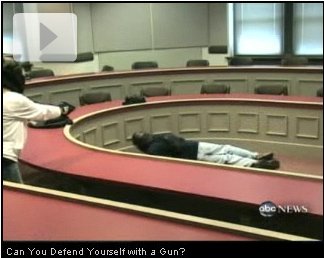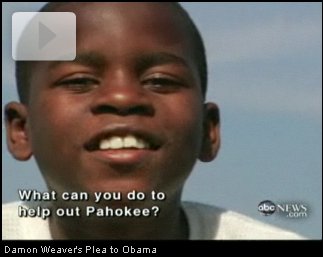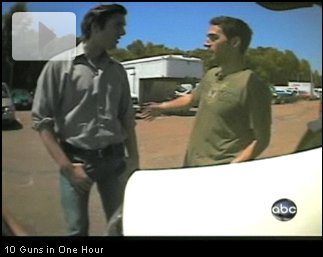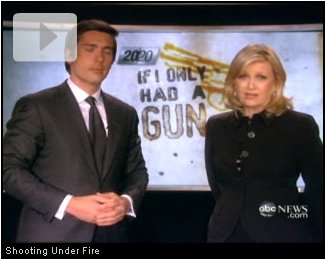I suspected that I would regret it, but I did it anyway. I watched Diane Sawyer’s report, “If I Only Had a Gun,” on ABC’s
20/20 last night. I was expecting bias that would lean away from gun ownership and the right to arms, but what I saw was an hour of shamefully unadulterated propaganda.
I’m not naive when it comes to journalism. I’ve had my share of experience being misquoted, plagiarized, and editorially marginalized, but this was mainstream media bias in rare form. There were omissions, lies, and even fabricated evidence.
The broadcast sought to make four main points. Firearms are ineffective weapons for self-defense. Children are in grave danger of being killed by improperly stored firearms. “Gun violence” plagues a small town in Florida. Weapons can be obtained too easily through the “gun-show loophole.”
Can You Defend Yourself with a Gun?The first segment dealt with carrying handguns for self-defense. To demonstrate that armed civilians are doomed to failure, ABC contrived a scenario designed to almost guarantee such failure. Posing as a deranged gunman, a well-trained police firearms instructor bursts into a small classroom and begins shooting simulated bullets. A barely trained college student wearing an awkwardly long shirt, bulky gloves, and cumbersome headgear is expected to engage this threat with his own mock handgun. Naturally, none of ABC’s handpicked subjects were able to make any quickly incapacitating shots. However, though this fact was minimized, one young woman did manage to deliver a probably fatal wound to the assailant’s femoral artery, which would have mitigated the casualties from his rampage as he rapidly bled to death on the classroom floor.

Indeed, if someone walks up and immediately begins shooting you at close range, your chance to successfully defend yourself is already over, regardless of how well you may be armed. This applies even to well-trained police officers, who are far less common than ABC implied. Throughout the segment, video of intensive tactical training suggested that the average cop is a firearms expert. Unfortunately, standard police and even military firearms training is actually very basic. My own marksmanship skills are minimal, but even I have outperformed federal law-enforcement officers at the shooting range.
However, any honest right-to-arms advocate will tell you that a firearm is not a magic talisman that will guarantee your survival in a violent confrontation. Having a gun merely gives you a fighting chance, but that chance can be very small. I know that I would rather risk injury in defense of my loved ones than do nothing only to see them brutally murdered.
Extrapolating from this worst-case scenario that carrying a handgun can never help you in a violent encounter would be unwise at best, but this is exactly what ABC did. As further evidence, Diane Sawyer herself stepped up to a police simulator and failed to draw her sidearm quickly enough. Of course, that was a self-fulfilling prophecy, but don’t let her cover you in a potential firefight.
In the end, ABC and Diane Sawyer were making a case that no one should be armed, not even the police. Of course, total disarmament is the ultimate goal of the gun-control movement. Despite their wishful thinking for a non-violent society, if the prohibitionists ever succeed, they would only turn the whole world
back into Pahokee, Florida, as we will see in a moment.
When Older Kids Find GunsThe second segment explored the attraction guns hold for both younger and older kids. In another poorly constructed experiment, children were shown handling and playing with firearms placed where the kids would find them. Why this should surprise anyone is unclear.
Children are naturally curious. When adults try to hide something from them, they become even more eager to explore. The lure of forbidden fruit is a well-known phenomenon.
As usual, the answer is proper education. In the show, only the young man with gun-safety training resisted the temptation to improperly handle a found gun. The others all demonstrated their profound ignorance, though this occasionally had to be encouraged by ABC collaborators. Education saves lives.
Fortunately, accidental shooting deaths are actually very rare.
Damon Weaver’s Plea to ObamaPahokee is a town of 6,000 souls, few jobs, and an “infinity of guns.” When darkness falls, the violence begins. Gangs rule this place, and by the light of day, the law-abiding residents are too frightened to help the police. Young, would-be journalist Damon Weaver asks what President Barack H. Obama will do to help his town.
Criminal gangs are the problem here. Criminals are already prohibited from having firearms, but one gang member boasts that he can get an illegal handgun for $60. When I legally purchased a police-surplus pistol for $350, I thought that was a smoking-hot deal.
Violent gangs are a problem older than human civilization. In fact, they are the problem that led us to form governments and states. We can no longer apply the historical military solutions, but until we put an end to the institutionalized poverty that encourages modern gangs and to the black markets that finance them, the problem will persist.
Firearms prohibitionists would unintentionally—or so I assume—return the whole world to the conditions of Pahokee, Florida. When the good people are disarmed, it will once again be the ruthless, violent gangs that dictate social policy. Violence as a means of conflict resolution is most effectively neutralized only when all sides are equally equipped to do violence.
I will answer little Damon’s question with my usual cynicism. President Obama will do nothing to help Pahokee. Doing so would be to reject the institutionalized poverty and paternalistic racism that is his party’s source of political power.
10 Guns in One HourThe next myth that ABC promoted was the “gun-show loophole.” I have already written
an article on this topic, but let me reiterate that there is no loophole. All federal, state, and local laws continue to apply at gun shows.
To illustrate their point, ABC gave $5,000 to the grieving brother of a Virginia Tech victim and sent him to a gun show in Richmond. Within an hour, the young man was able to buy 10 firearms (mostly old rifles and shotguns) from private parties at the show. He found some pretty good deals but nothing approaching the $60 stolen handguns in Pahokee.
Shooting Under FireThe final segment wrapped up the rigged experiment that opened the broadcast. Diane Sawyer closed with this blatantly false statement: “… if you’re wondering where’re all the studies about the effectiveness of guns used by ordinary Americans for self-defense, well keep searching. We could not find one reliable study.…” Apparently, Ms. Sawyer and her “research” staff have never heard of libraries or even
Google Scholar, where the ongoing academic discussion on the subject can be uncovered in less than five seconds … or maybe the facts didn’t support their predetermined conclusions.
About the only thing that ABC and Diane Sawyer got right in this report is the fact that you are unlikely to be shot and even less likely to be shot fatally. A gunfight is one of the last places anyone should want to be, but having a gun does improve your odds of survival, according to federal crime data. That fact was nowhere to be seen in last night’s broadcast.
Firearms aren’t for everyone, but we have an inalienable right to arms. The U.S. Supreme Court has now recognized that fact. Nevertheless, the prohibitionists in the mainstream media clearly aren’t ready to abandon their propaganda campaign.








